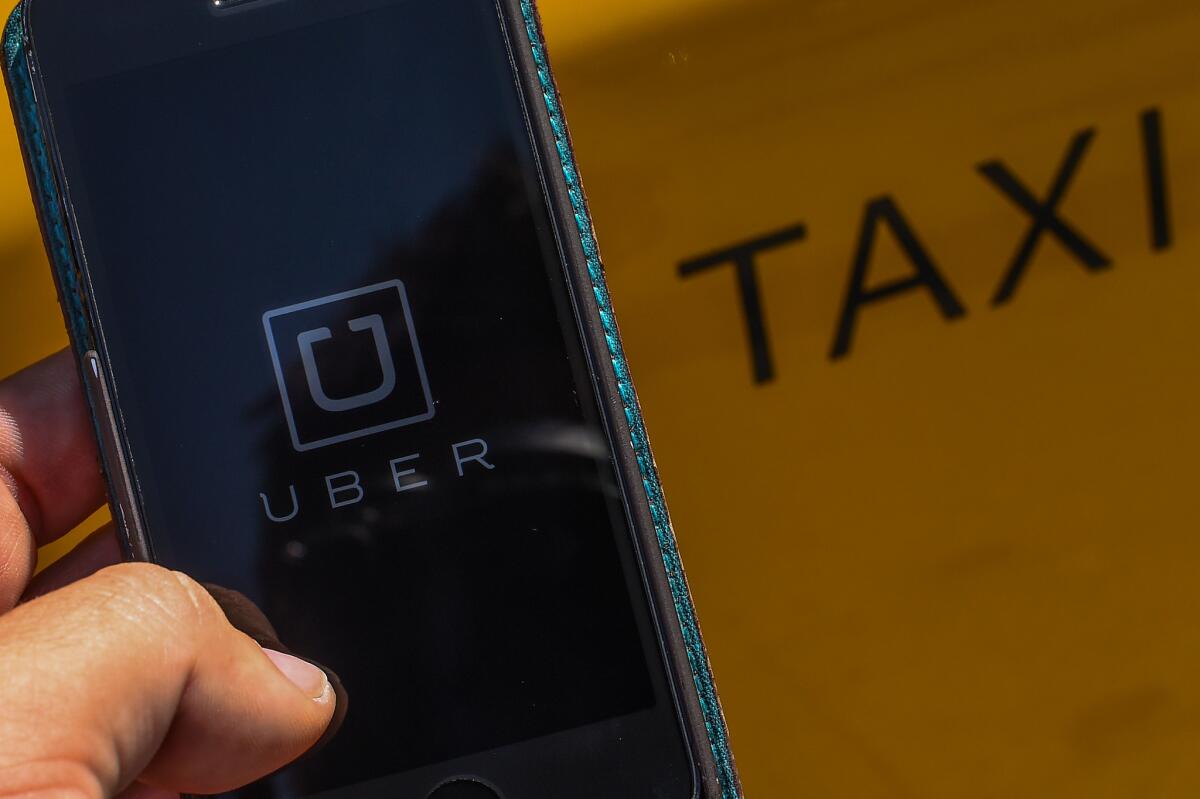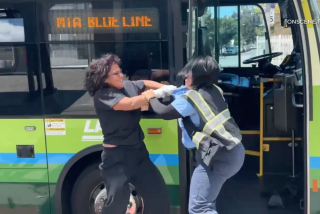California taxis sue Uber, allege false advertising, unfair competition

Taxi drivers in California must submit to fingerprinting for criminal background checks. UberX drivers donât have to. Yet Uber Technologies advertises itself as âthe safest rides on the roadâ and executives tout Uber as âsafer than a taxi.â
Thatâs deceptive advertising and has caused âsignificant harmâ to the taxi industry, 19 cab companies in California claimed Wednesday morning in a lawsuit filed in federal court. The companies allege that Uberâs false claims hurt the profits and reputations of the taxi business, and are seeking an injunction against what they call false claims, and unspecified damages.
The plaintiffs include cab companies up and down the state, from San Francisco to Palm Springs to San Diego, though most are located near Los Angeles. Southland companies include All Yellow Taxi in Gardena, Bell Cab in Hawthorne, Cabco Yellow in Santa Ana and LA City Cab in Sun Valley.
The companies have suffered both financial and reputational harm to their businesses, according to the lawsuit.
âPlaintiffsâ taxi cabs vie for the same customers as Uber cars, and -- as a result -- compete for the same dollars,â reads the complaint, filed in U.S. District Court in San Francisco. Potential customers, the suit says, âmistakenly believe that they will get a safer ride by hiring an UberX ride -- spurn plaintiffâs taxi cabs for UberX rides, resulting in lost revenue for plaintiffs.â
The plaintiffs also take issue with Uber charging a âsafe rides fee,â an additional dollar tacked onto each ride that Uber says goes toward driver background checks and safety features. The complaint alleges that the fee has âthe tendency to deceiveâ customers into thinking that by paying the fee, they are âreceiving the safest ride possible.â
âThis frivolous lawsuit is simply without merit,â Uber spokeswoman Eva Behrend said in a statement. âAs riders across the country know, Uberâs multi-layered driver screening includes county, federal and multi-state checks and the rating system and traceability of the Uber platform gives riders and drivers unprecedented transparency.
âThis lawsuit was filed by an industry that for decades has ignored the safety of riders and drivers -- and that in San Francisco, allows up to two drug or alcohol offenses for drivers and only looks back five years into a driverâs background, with limited recourse for complaints and wrongdoings.â
Contrary to Uberâs claims, the suit says, taxis are more rigorous about safety than Uber, and for Uber to publicly say otherwise violates federal and state laws that prohibit false advertising.
Uberâs third-party background checks, plaintiffs say, donât require fingerprinting and thus are less rigorous than the electronic fingerprinting of taxi drivers and subsequent background checks required by California law.
Those prints are run through a Department of Justice criminal database. The process is superior to Uberâs background checks, the suit says, because âfingerprinting helps uncover criminal history not discovered through traditional methods, offers extra protection to aid in meeting industry guidelines and helps prevent fraud.â
The complaint also points out that taxi drivers must undergo a written exam and take driver safety training courses, while Uber requires no driver training or written exams.
The suit says taxis undergo regular vehicle inspections more thorough than what Uber requires. And the plaintiffs allege that because many Uber drivers also drive for ride-hailing competitor Lyft, their drivers are frequently distracted as they toggle between mobile apps while on the road.
âThe case is really about the continued perpetuation by Uber of the myth that it offers the safest ride on the road,â said plaintiffsâ attorney Bruce Simon of Pearson, Simon & Warshaw in San Francisco. The plaintiffs are also represented by the Dolan Law Firm in San Francisco, which has filed a separate suit against Uber in a case in which an Uber driver ran over a 6-year-old girl and killed her on New Yearâs Eve in 2013.
UberX has bitten into 20% to 40% of revenues, several of the cab companies say, and they believe the companyâs marketing of its safety is partly to blame. Lower price is likely another factor: Depending on demand, UberX can be 40% cheaper than a taxi cab. But California law allows false advertising trials even if the alleged behavior is only partially responsible for financial loss.
The lawsuit is similar to one filed by the district attorneys of San Francisco and Los Angeles late last year, which also alleged that Uber misled the public by saying it uses an âindustry-leading background check processâ when it doesnât fingerprint its drivers.
âThe company repeats this misleading statement, giving consumers a false sense of security when deciding whether to get into a strangerâs car,â San Francisco Dist. Atty. George Gascon said at the time.
According to Simon, the district attorneysâ lawsuit is mainly about consumers, while Wednesdayâs complaint is broader and on behalf of the cab companies themselves. Simon said he sees the two lawsuits as complementary.
Uber has in the past refuted claims that its driver-screening process is not thorough enough. It has detailed on its blog how its drivers are screened against county and federal court records, motor vehicle records and the national sex offender registry.
Speaking to the Los Angeles Times in early March, the companyâs head of global safety, Phil Cardenas, said its driver background checks -- which use courthouse records -- are able to capture information that the FBI database Live Scan may not capture, such as pending charges and appeals. He also noted that the FBI database isnât necessarily complete and is subject to human error, since a lot of the data is manually handled.
Cardenas said driver background checks are an element of safety, but not the âfull thing.â
âI think of it as the life cycle of a driver,â he said. â[When] the driver signs up on our site, they provide a ton of personal info. We know their bank account, their driverâs license information, their address. Thereâs no anonymity.
âEvery single trip is tracked with GPS ⌠and the final element is ⌠we have this amazing feedback system. [So even if a] background check comes back OK, if there was a challenging ride, you can still provide feedback about that user and we follow up on every single one of those feedback.â
The plaintiffs are seeking damages for lost revenues and damage to reputation. If the case goes to trial, it will be up to a jury to determine how much the taxi cab companies should be awarded.
Twitter: @traceylien







